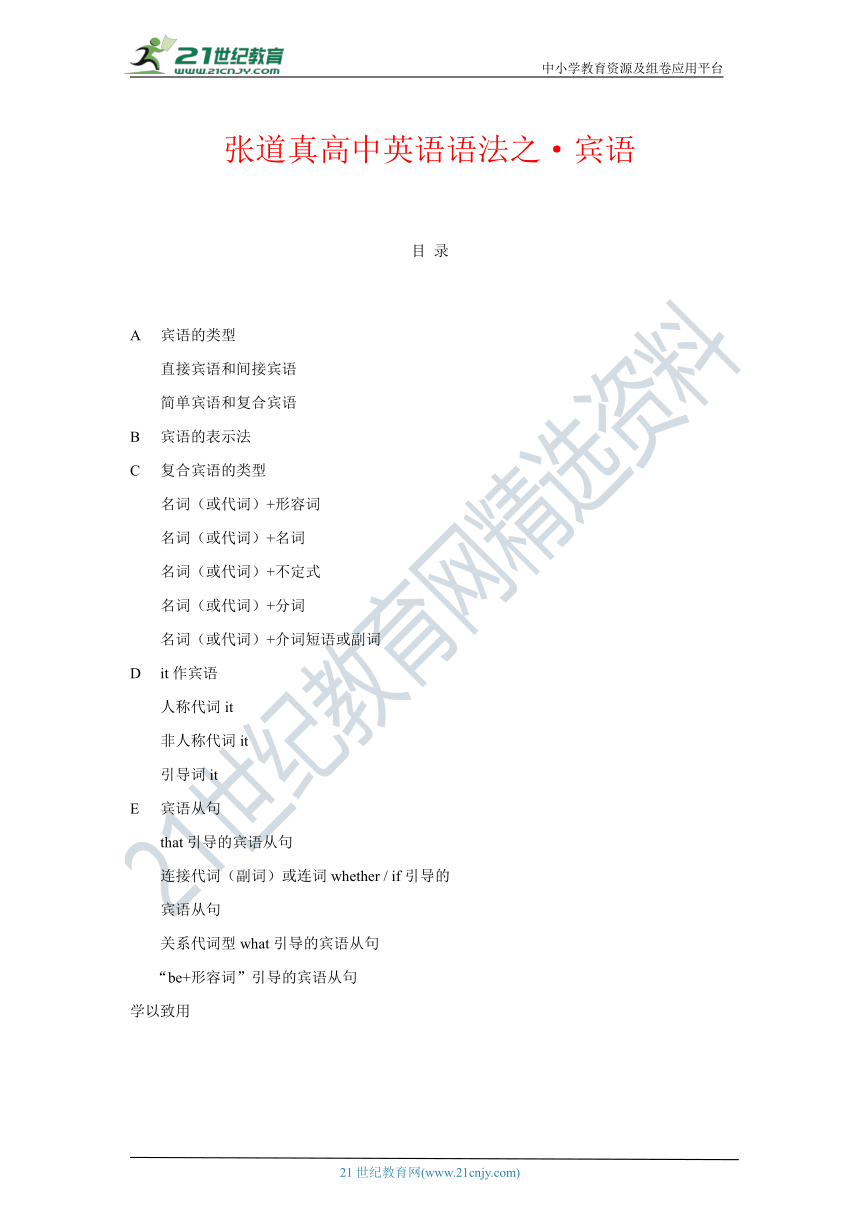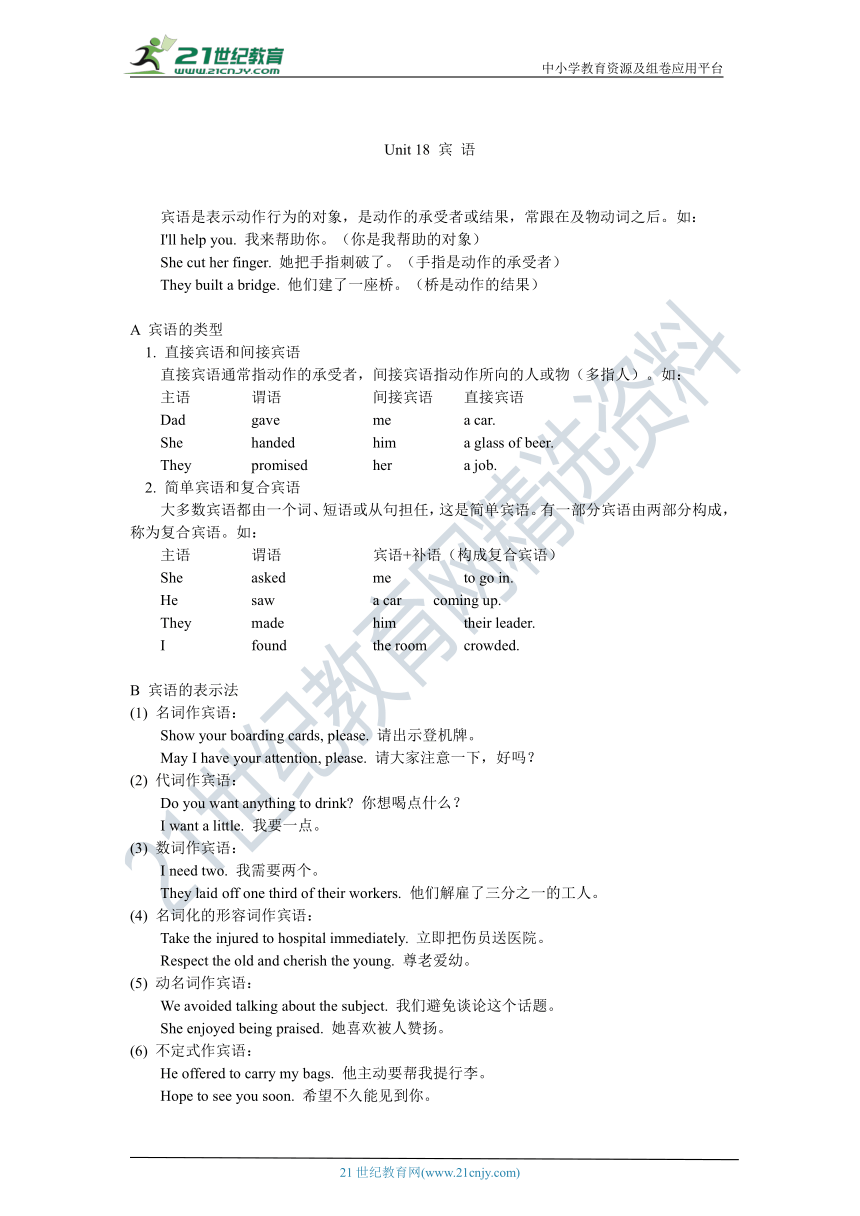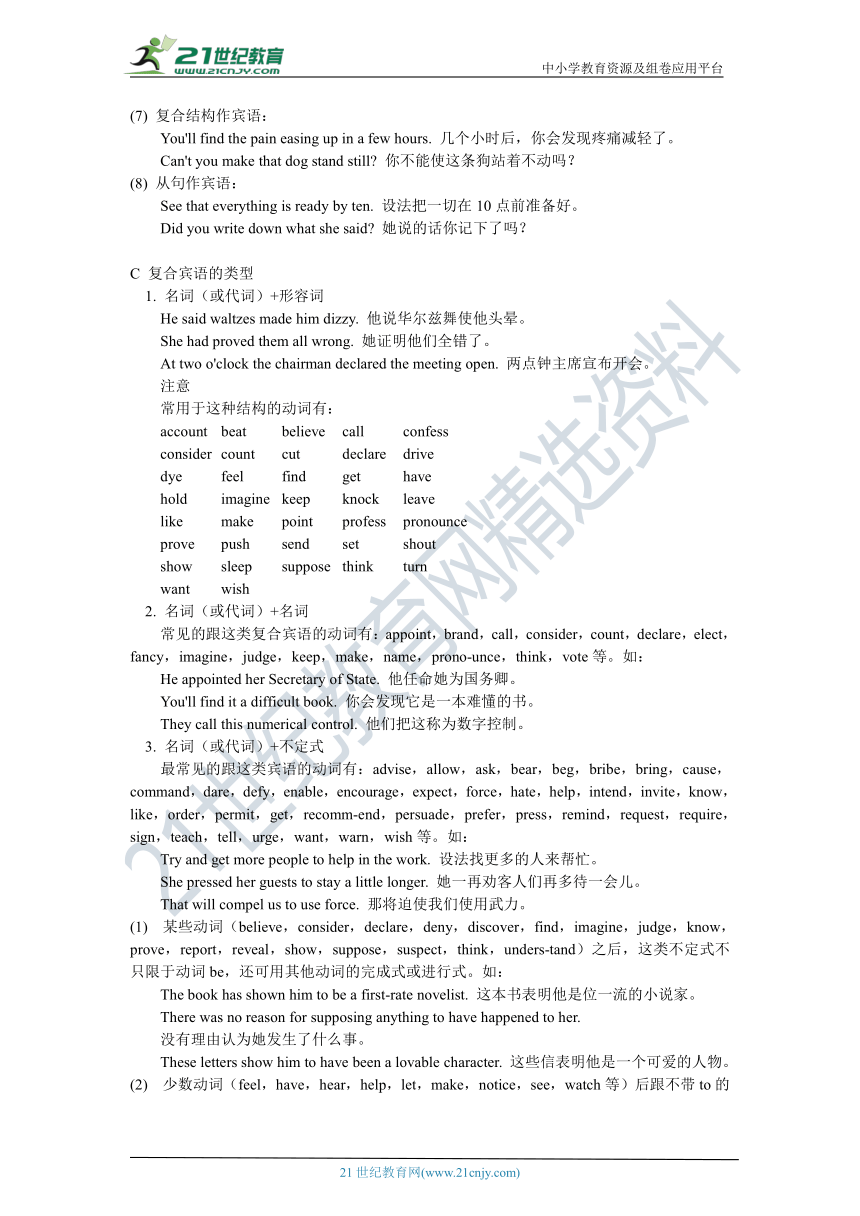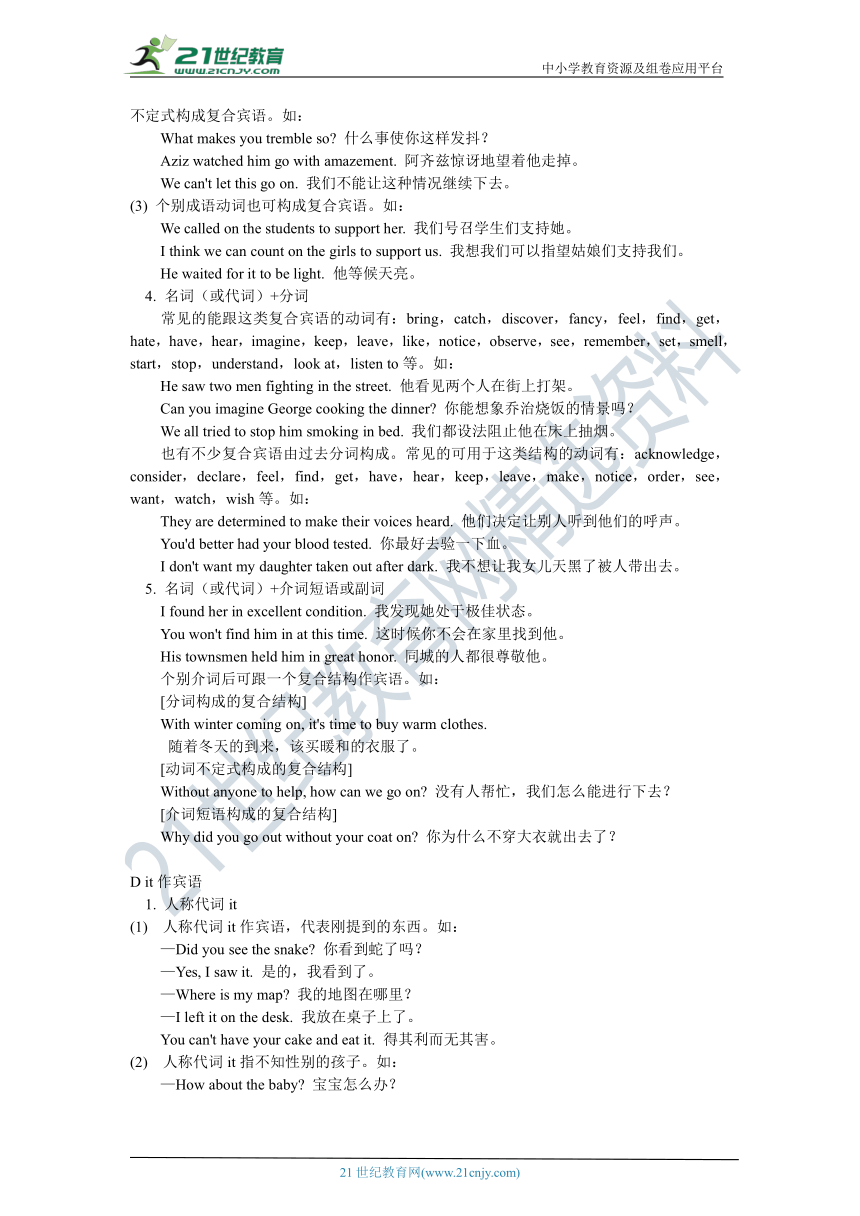高中英语语法之18宾语
图片预览




文档简介
中小学教育资源及组卷应用平台
张道真高中英语语法之·宾语
目 录
A 宾语的类型
???? 直接宾语和间接宾语
???? 简单宾语和复合宾语
B 宾语的表示法
C 复合宾语的类型
???? 名词(或代词)+形容词
???? 名词(或代词)+名词
???? 名词(或代词)+不定式
???? 名词(或代词)+分词
???? 名词(或代词)+介词短语或副词
D it作宾语
???? 人称代词it
???? 非人称代词it
???? 引导词it
E 宾语从句
???? that引导的宾语从句
???? 连接代词(副词)或连词whether / if引导的
宾语从句
???? 关系代词型what引导的宾语从句
???? “be+形容词”引导的宾语从句
学以致用
Unit 18 宾 语
宾语是表示动作行为的对象,是动作的承受者或结果,常跟在及物动词之后。如:
I'll help you. 我来帮助你。(你是我帮助的对象)
She cut her finger. 她把手指刺破了。(手指是动作的承受者)
They built a bridge. 他们建了一座桥。(桥是动作的结果)
A 宾语的类型
1. 直接宾语和间接宾语
直接宾语通常指动作的承受者,间接宾语指动作所向的人或物(多指人)。如:
主语 谓语 间接宾语 直接宾语
Dad gave me a car.
She handed him a glass of beer.
They promised her a job.
2. 简单宾语和复合宾语
大多数宾语都由一个词、短语或从句担任,这是简单宾语。有一部分宾语由两部分构成,称为复合宾语。如:21cnjy.com
主语 谓语 宾语+补语(构成复合宾语)
She asked me to go in.
He saw a car coming up.
They made him their leader.
I found the room crowded.
B 宾语的表示法
(1) 名词作宾语:
Show your boarding cards, please. 请出示登机牌。
May I have your attention, please. 请大家注意一下,好吗?
(2) 代词作宾语:
Do you want anything to drink? 你想喝点什么?
I want a little. 我要一点。
(3) 数词作宾语:
I need two. 我需要两个。
They laid off one third of their workers. 他们解雇了三分之一的工人。
(4) 名词化的形容词作宾语:
Take the injured to hospital immediately. 立即把伤员送医院。www.21-cn-jy.com
Respect the old and cherish the young. 尊老爱幼。
(5) 动名词作宾语:
We avoided talking about the subject. 我们避免谈论这个话题。
She enjoyed being praised. 她喜欢被人赞扬。
(6) 不定式作宾语:
He offered to carry my bags. 他主动要帮我提行李。
Hope to see you soon. 希望不久能见到你。
(7) 复合结构作宾语:
You'll find the pain easing up in a few hours. 几个小时后,你会发现疼痛减轻了。
Can't you make that dog stand still? 你不能使这条狗站着不动吗?
(8) 从句作宾语:
See that everything is ready by ten. 设法把一切在10点前准备好。
Did you write down what she said? 她说的话你记下了吗?
C 复合宾语的类型
1. 名词(或代词)+形容词
He said waltzes made him dizzy. 他说华尔兹舞使他头晕。
She had proved them all wrong. 她证明他们全错了。
At two o'clock the chairman declared the meeting open. 两点钟主席宣布开会。
注意
常用于这种结构的动词有:
account beat believe call confess
consider count cut declare drive
dye feel find get have
hold imagine keep knock leave
like make point profess pronounce
prove push send set shout
show sleep suppose think turn
want wish
2. 名词(或代词)+名词
常见的跟这类复合宾语_?????¨è????????a_ppoint,brand,call,consider,count,declare,elect,fancy,imagine,judge,keep,make,name,prono-unce,think,vote等。如:
He appointed her Secretary of State. 他任命她为国务卿。
You'll find it a difficult book. 你会发现它是一本难懂的书。
They call this numerical control. 他们把这称为数字控制。
3. 名词(或代词)+不定式
最常见的跟这_?±????è???????¨è??_有:advise,allow,ask,bear,beg,bribe,bring,cause,command,dare,defy,enable,encourage,expect,force,hate,help,intend,invite,know,like,order,permit,get,recomm-end,persuade,prefer,press,remind,request,require,sign,teach,tell,urge,want,warn,wish等。如:21世纪教育网版权所有
Try and get more people to help in the work. 设法找更多的人来帮忙。
She pressed her guests to stay a little longer. 她一再劝客人们再多待一会儿。
That will compel us to use force. 那将迫使我们使用武力。
(1) 某些动词(bel_ieve???c_onsider,declare,deny,discover,find,imagine,judge,know,prove,report,reveal,show,suppose,suspect,think,unders-tand)之后,这类不定式不只限于动词be,还可用其他动词的完成式或进行式。如:【出处:21教育名师】
The book has shown him to be a first-rate novelist. 这本书表明他是位一流的小说家。
There was no reason for supposing anything to have happened to her.
没有理由认为她发生了什么事。
These l_etters_ show him to have been a lovable character. 这些信表明他是一个可爱的人物。
(2) 少数动词(fe_el???hav_e,hear,help,let,make,notice,see,watch等)后跟不带to的不定式构成复合宾语。如:
What makes you tremble so? 什么事使你这样发抖?
Aziz watched him go with amazement. 阿齐兹惊讶地望着他走掉。
We can't let this go on. 我们不能让这种情况继续下去。
(3) 个别成语动词也可构成复合宾语。如:
We called on the students to support her. 我们号召学生们支持她。
I think we can count on the girls to support us. 我想我们可以指望姑娘们支持我们。
He waited for it to be light. 他等候天亮。
4. 名词(或代词)+分词
常见的能跟这类复合宾语的动词_??????brin_g,catch,discover,fancy,feel,find,get,hate,have,hear,imagine,keep,leave,like,notice,observe,see,remember,set,smell,start,stop,understand,look at,listen to等。如:
He saw two men fighting in the street. 他看见两个人在街上打架。
Can you imagine George cooking the dinner? 你能想象乔治烧饭的情景吗?
We all tried to stop him smoking in bed. 我们都设法阻止他在床上抽烟。
也有不少复合宾_è????±è????????è??_构成。常见的可用于这类结构的动词有:acknowledge,consider,declare,feel,find,get,have,hear,keep,leave,make,notice,order,see,want,watch,wish等。如:
They are determined to make their voices heard. 他们决定让别人听到他们的呼声。
You'd better had your blood tested. 你最好去验一下血。
I don't want my daughter taken out after dark. 我不想让我女儿天黑了被人带出去。
5. 名词(或代词)+介词短语或副词
I found her in excellent condition. 我发现她处于极佳状态。
You won't find him in at this time. 这时候你不会在家里找到他。
His townsmen held him in great honor. 同城的人都很尊敬他。21教育名师原创作品
个别介词后可跟一个复合结构作宾语。如:
[分词构成的复合结构]
With winter coming on, it's time to buy warm clothes.
随着冬天的到来,该买暖和的衣服了。
[动词不定式构成的复合结构]
Without anyone to help, how can we go on? 没有人帮忙,我们怎么能进行下去?
[介词短语构成的复合结构]
Why did you go out without your coat on? 你为什么不穿大衣就出去了?
D it作宾语
1. 人称代词it
(1) 人称代词it作宾语,代表刚提到的东西。如:
—Did you see the snake? 你看到蛇了吗?
—Yes, I saw it. 是的,我看到了。
—Where is my map? 我的地图在哪里?
—I left it on the desk. 我放在桌子上了。
You can't have your cake and eat it. 得其利而无其害。
(2) 人称代词it指不知性别的孩子。如:
—How about the baby? 宝宝怎么办?
—I'll take care of it. 我来照顾他(她)。
(3) 表示刚提到的一件事。如:
If I can stop her coming to you, I shall do it. 如果我能阻止她来找你,我会做的。
—I want to stay. 我想留下。
—Your wife won't agree with it. 你妻子不会赞成的。
You've saved my life; I shall never forget it. 你救过我的命,我永远不会忘记。
2. 非人称代词it
it在某些习语中用作动词宾语或介词宾语。
(1) it用作动词宾语。如:
beat it 快跑;走开 take it easy 别着急 believe it or not 信不信由你
cool it 冷静下来 make it 成功 rough it 过苦日子
He ha_d_drea_med of being rich and famous, and he became very bitter when he realized that he would never make it. 他梦想发财成名,当他意识到他的梦想永远不能实现时,怒气冲天。
(2) it用作介词宾语。如:
run for it 拼命地 be for it 受罚
There is nothing to it. 做起来容易。
Think nothing of it. 不客气;没关系。
You'll be for it when they find out who broke the windows.21教育网
当他们得知是谁打破了窗户,你将会受到惩罚。
—Thank you very much for all your help. 非常感谢你的帮助。21·世纪*教育网
—Think nothing of it. 不客气。
3. 引导词it
先行词it可置于谓语动词之后作形式宾语,而它所代表的宾语置于句子之后。
(1) 先行词it代表不定式:
I found it easy to get on with her. 我发现与她很容易相处。
He makes it a rule to give short speeches. 他规定自己讲短话。
He thought it best to be on his guard. 他认为最好保持警惕。
(2) 先行词it代表that引导的从句(that有时可省略):
He has made it__a_rul_e that he goes to bed late at night. 他晚上晚睡已成为习惯。
I take it you've been out. 我猜你出去了。
They kept it quiet that he was dead. 他死了的消息他们没有张扬出去。
(3) 先行词it代表连接代(副)词引导的从句:
He soon made it clear why he had asked for a conference. www-2-1-cnjy-com
他很快表明为什么要求召开会议。
They haven't made it known where they are to hold the conference. 2-1-c-n-j-y
他们还没有宣布在哪里举行会议。
(4) 先行词it代表动名词:
I think__it_ve_ry unwise going on as we are without a definite agreement.
我认为像我们继续下去而没有明确的协议是不明智的。
I consider _it_poi_ntless expecting Andrew to help. 我认为,指望安德鲁来帮忙是没有用的。
E 宾语从句
1. that引导的宾语从句
(1) that引导的宾语_????????????è?????_常见的能跟这类从句的动词有:add,admit,advise,agree,announce,answer,believe,command,comment,complain,decide,demand,deny,determine,direct,discov-er,doubt,dream,expert,explain,fear,feel,find,forget,guess,hear,hope,imagine,inform,insist,intend,know,learn,mean,move,order,predict,prefer,promise,propose,prove,provide,realize,request,remember,reply,report,say,see,shout,suggest,support,tell,think,wish等。如:21*cnjy*com
Morgan answered that he was from Austria. 摩根说他是奥地利人。
Remember that the conquest of glory excels the glory of conquest. 21*cnjy*com
且记,荣誉的征服胜于征服的荣誉。
I suggest that it was time to leave. 我提出该离开了。
注意
that引导的宾语从句只用在少数介词后,如except,in,but等。此时that不能省略。如:
I know little about him except that he lives downstairs.
我对他知之甚少,只知道他住在楼下。
He differed__from__his classmates in that he devoted his spare time to reading.
他和他的同学不同的地方在于他把空闲时间用在阅读上。
(2) 在think,con_sider???_believe,suppose,expect,fancy等动词后的宾语从句,如表示否定含义,通常要把否定词移到主句的谓语上,从句的谓语动词用肯定形式。如:
I don't think she's interested in such activities. 我想她对这种活动没有兴趣。
She didn't believe she would ever see him again. 她相信她不会再见他。
I don't suppose she likes the book. 我认为她不喜欢这本书。
注意
不过有时主要动词的否定形式只表示它自身是否定的,试比较下面的句子:
I don't think we need waste much time on it. 我想我们不必在这上面花太多的时间。
We didn't think we'd be so late. 我们没想到我们会到达得这么晚。
I don't suppose I'll trouble you again. 我想我不会再麻烦你了。2·1·c·n·j·y
Don't suppose that is your fault. 不要认为这是你的错。
(3) it作先行宾语,把真正的宾语放在句末,这种情况常出现在带复合宾语的句子中。如:
You may depend upon it they are valuable. 你可以放心,它们是很珍贵的。
He doesn't want it to be known that he's going away. 他不想让人知道他要离开。
Robert has se_en_to__it that all the leaks were shut off. 罗伯特已负责让所有的漏洞都堵上。
2. 连接代词(副词)或连词whether/if引导的宾语从句
(1) 常见的_??¨?????????è?????_代词(副词)的动词有:agree,ask,care,decide,discover,discuss,explain,express,find out,forget,guess,hear,imagine,know,learn,realize,remember,report,say,see,show,suggest,tell,think,understand,watch等。如:
Daisy inquired how we are getting on. 黛西问我们情况怎么样。【来源:21·世纪·教育·网】
I wonder what's happened. 我想知道发生了什么事。
Can you see what the sign says? 你能看清牌子上写的是什么吗?
(2) whether和if也可用来引导宾语从句。如:
I didn't know whether they liked the place. 我不知道他们是否喜欢这个地方。
Ginny didn't say if he was still alive. 金妮没说他是否还活着。
He enquired if his parents spoke Spanish. 他问他的父母是否会讲西班牙语。
注意
doubt(怀疑)用于肯定句,要用if / whether引导宾语从句;用于否定句和疑问句,要用that引导宾语从句。如:
I doubt whether / if he will succeed. 我怀疑他是否会成功。
Do you doubt that he will win? 你不相信他会赢吗?
I do not doubt that he can recite the poem.
我不相信他能把这首诗背下来。
(3) 用作介词宾语引导的宾语从句。如:
It depends on__wheth_er we can get their cooperation. 这得看我们是否能得到他们的合作。
I worry about whether I hurt her feelings. 我为是否伤了她的感情而担忧。
3. 关系代词型what引导的宾语从句
They thou_ght_th_ey could do what they liked with him. 他们认为他们可以对他为所欲为。
Philip was depressed by what he had gone through. 他经历的事使菲利普感到压抑。
Go to stamp sales and buy whatever you can afford. 21·cn·jy·com
去邮票销售点把你能够买得起的邮票买下来。
Give it to whomever (whoever) you like. 你爱把它给谁就给谁吧。
4. “be+形容词”引导的宾语从句
“be+形容词”这类结构后常跟从句,在概念上有时接近宾语,但在结构上接近状语。如:
I'm afraid (=fear) I have made a serious mistake. 我担心我犯了一个严重的错误。
We are sure (=know for sure) that we shall succeed. 我们确信我们会成功。
We are confide_nt_(=b_elieve) we can overcome these difficulties. 我们有信心克服这些困难。
_21?????????è?????(www.21cnjy.com)_
张道真高中英语语法之·宾语
目 录
A 宾语的类型
???? 直接宾语和间接宾语
???? 简单宾语和复合宾语
B 宾语的表示法
C 复合宾语的类型
???? 名词(或代词)+形容词
???? 名词(或代词)+名词
???? 名词(或代词)+不定式
???? 名词(或代词)+分词
???? 名词(或代词)+介词短语或副词
D it作宾语
???? 人称代词it
???? 非人称代词it
???? 引导词it
E 宾语从句
???? that引导的宾语从句
???? 连接代词(副词)或连词whether / if引导的
宾语从句
???? 关系代词型what引导的宾语从句
???? “be+形容词”引导的宾语从句
学以致用
Unit 18 宾 语
宾语是表示动作行为的对象,是动作的承受者或结果,常跟在及物动词之后。如:
I'll help you. 我来帮助你。(你是我帮助的对象)
She cut her finger. 她把手指刺破了。(手指是动作的承受者)
They built a bridge. 他们建了一座桥。(桥是动作的结果)
A 宾语的类型
1. 直接宾语和间接宾语
直接宾语通常指动作的承受者,间接宾语指动作所向的人或物(多指人)。如:
主语 谓语 间接宾语 直接宾语
Dad gave me a car.
She handed him a glass of beer.
They promised her a job.
2. 简单宾语和复合宾语
大多数宾语都由一个词、短语或从句担任,这是简单宾语。有一部分宾语由两部分构成,称为复合宾语。如:21cnjy.com
主语 谓语 宾语+补语(构成复合宾语)
She asked me to go in.
He saw a car coming up.
They made him their leader.
I found the room crowded.
B 宾语的表示法
(1) 名词作宾语:
Show your boarding cards, please. 请出示登机牌。
May I have your attention, please. 请大家注意一下,好吗?
(2) 代词作宾语:
Do you want anything to drink? 你想喝点什么?
I want a little. 我要一点。
(3) 数词作宾语:
I need two. 我需要两个。
They laid off one third of their workers. 他们解雇了三分之一的工人。
(4) 名词化的形容词作宾语:
Take the injured to hospital immediately. 立即把伤员送医院。www.21-cn-jy.com
Respect the old and cherish the young. 尊老爱幼。
(5) 动名词作宾语:
We avoided talking about the subject. 我们避免谈论这个话题。
She enjoyed being praised. 她喜欢被人赞扬。
(6) 不定式作宾语:
He offered to carry my bags. 他主动要帮我提行李。
Hope to see you soon. 希望不久能见到你。
(7) 复合结构作宾语:
You'll find the pain easing up in a few hours. 几个小时后,你会发现疼痛减轻了。
Can't you make that dog stand still? 你不能使这条狗站着不动吗?
(8) 从句作宾语:
See that everything is ready by ten. 设法把一切在10点前准备好。
Did you write down what she said? 她说的话你记下了吗?
C 复合宾语的类型
1. 名词(或代词)+形容词
He said waltzes made him dizzy. 他说华尔兹舞使他头晕。
She had proved them all wrong. 她证明他们全错了。
At two o'clock the chairman declared the meeting open. 两点钟主席宣布开会。
注意
常用于这种结构的动词有:
account beat believe call confess
consider count cut declare drive
dye feel find get have
hold imagine keep knock leave
like make point profess pronounce
prove push send set shout
show sleep suppose think turn
want wish
2. 名词(或代词)+名词
常见的跟这类复合宾语_?????¨è????????a_ppoint,brand,call,consider,count,declare,elect,fancy,imagine,judge,keep,make,name,prono-unce,think,vote等。如:
He appointed her Secretary of State. 他任命她为国务卿。
You'll find it a difficult book. 你会发现它是一本难懂的书。
They call this numerical control. 他们把这称为数字控制。
3. 名词(或代词)+不定式
最常见的跟这_?±????è???????¨è??_有:advise,allow,ask,bear,beg,bribe,bring,cause,command,dare,defy,enable,encourage,expect,force,hate,help,intend,invite,know,like,order,permit,get,recomm-end,persuade,prefer,press,remind,request,require,sign,teach,tell,urge,want,warn,wish等。如:21世纪教育网版权所有
Try and get more people to help in the work. 设法找更多的人来帮忙。
She pressed her guests to stay a little longer. 她一再劝客人们再多待一会儿。
That will compel us to use force. 那将迫使我们使用武力。
(1) 某些动词(bel_ieve???c_onsider,declare,deny,discover,find,imagine,judge,know,prove,report,reveal,show,suppose,suspect,think,unders-tand)之后,这类不定式不只限于动词be,还可用其他动词的完成式或进行式。如:【出处:21教育名师】
The book has shown him to be a first-rate novelist. 这本书表明他是位一流的小说家。
There was no reason for supposing anything to have happened to her.
没有理由认为她发生了什么事。
These l_etters_ show him to have been a lovable character. 这些信表明他是一个可爱的人物。
(2) 少数动词(fe_el???hav_e,hear,help,let,make,notice,see,watch等)后跟不带to的不定式构成复合宾语。如:
What makes you tremble so? 什么事使你这样发抖?
Aziz watched him go with amazement. 阿齐兹惊讶地望着他走掉。
We can't let this go on. 我们不能让这种情况继续下去。
(3) 个别成语动词也可构成复合宾语。如:
We called on the students to support her. 我们号召学生们支持她。
I think we can count on the girls to support us. 我想我们可以指望姑娘们支持我们。
He waited for it to be light. 他等候天亮。
4. 名词(或代词)+分词
常见的能跟这类复合宾语的动词_??????brin_g,catch,discover,fancy,feel,find,get,hate,have,hear,imagine,keep,leave,like,notice,observe,see,remember,set,smell,start,stop,understand,look at,listen to等。如:
He saw two men fighting in the street. 他看见两个人在街上打架。
Can you imagine George cooking the dinner? 你能想象乔治烧饭的情景吗?
We all tried to stop him smoking in bed. 我们都设法阻止他在床上抽烟。
也有不少复合宾_è????±è????????è??_构成。常见的可用于这类结构的动词有:acknowledge,consider,declare,feel,find,get,have,hear,keep,leave,make,notice,order,see,want,watch,wish等。如:
They are determined to make their voices heard. 他们决定让别人听到他们的呼声。
You'd better had your blood tested. 你最好去验一下血。
I don't want my daughter taken out after dark. 我不想让我女儿天黑了被人带出去。
5. 名词(或代词)+介词短语或副词
I found her in excellent condition. 我发现她处于极佳状态。
You won't find him in at this time. 这时候你不会在家里找到他。
His townsmen held him in great honor. 同城的人都很尊敬他。21教育名师原创作品
个别介词后可跟一个复合结构作宾语。如:
[分词构成的复合结构]
With winter coming on, it's time to buy warm clothes.
随着冬天的到来,该买暖和的衣服了。
[动词不定式构成的复合结构]
Without anyone to help, how can we go on? 没有人帮忙,我们怎么能进行下去?
[介词短语构成的复合结构]
Why did you go out without your coat on? 你为什么不穿大衣就出去了?
D it作宾语
1. 人称代词it
(1) 人称代词it作宾语,代表刚提到的东西。如:
—Did you see the snake? 你看到蛇了吗?
—Yes, I saw it. 是的,我看到了。
—Where is my map? 我的地图在哪里?
—I left it on the desk. 我放在桌子上了。
You can't have your cake and eat it. 得其利而无其害。
(2) 人称代词it指不知性别的孩子。如:
—How about the baby? 宝宝怎么办?
—I'll take care of it. 我来照顾他(她)。
(3) 表示刚提到的一件事。如:
If I can stop her coming to you, I shall do it. 如果我能阻止她来找你,我会做的。
—I want to stay. 我想留下。
—Your wife won't agree with it. 你妻子不会赞成的。
You've saved my life; I shall never forget it. 你救过我的命,我永远不会忘记。
2. 非人称代词it
it在某些习语中用作动词宾语或介词宾语。
(1) it用作动词宾语。如:
beat it 快跑;走开 take it easy 别着急 believe it or not 信不信由你
cool it 冷静下来 make it 成功 rough it 过苦日子
He ha_d_drea_med of being rich and famous, and he became very bitter when he realized that he would never make it. 他梦想发财成名,当他意识到他的梦想永远不能实现时,怒气冲天。
(2) it用作介词宾语。如:
run for it 拼命地 be for it 受罚
There is nothing to it. 做起来容易。
Think nothing of it. 不客气;没关系。
You'll be for it when they find out who broke the windows.21教育网
当他们得知是谁打破了窗户,你将会受到惩罚。
—Thank you very much for all your help. 非常感谢你的帮助。21·世纪*教育网
—Think nothing of it. 不客气。
3. 引导词it
先行词it可置于谓语动词之后作形式宾语,而它所代表的宾语置于句子之后。
(1) 先行词it代表不定式:
I found it easy to get on with her. 我发现与她很容易相处。
He makes it a rule to give short speeches. 他规定自己讲短话。
He thought it best to be on his guard. 他认为最好保持警惕。
(2) 先行词it代表that引导的从句(that有时可省略):
He has made it__a_rul_e that he goes to bed late at night. 他晚上晚睡已成为习惯。
I take it you've been out. 我猜你出去了。
They kept it quiet that he was dead. 他死了的消息他们没有张扬出去。
(3) 先行词it代表连接代(副)词引导的从句:
He soon made it clear why he had asked for a conference. www-2-1-cnjy-com
他很快表明为什么要求召开会议。
They haven't made it known where they are to hold the conference. 2-1-c-n-j-y
他们还没有宣布在哪里举行会议。
(4) 先行词it代表动名词:
I think__it_ve_ry unwise going on as we are without a definite agreement.
我认为像我们继续下去而没有明确的协议是不明智的。
I consider _it_poi_ntless expecting Andrew to help. 我认为,指望安德鲁来帮忙是没有用的。
E 宾语从句
1. that引导的宾语从句
(1) that引导的宾语_????????????è?????_常见的能跟这类从句的动词有:add,admit,advise,agree,announce,answer,believe,command,comment,complain,decide,demand,deny,determine,direct,discov-er,doubt,dream,expert,explain,fear,feel,find,forget,guess,hear,hope,imagine,inform,insist,intend,know,learn,mean,move,order,predict,prefer,promise,propose,prove,provide,realize,request,remember,reply,report,say,see,shout,suggest,support,tell,think,wish等。如:21*cnjy*com
Morgan answered that he was from Austria. 摩根说他是奥地利人。
Remember that the conquest of glory excels the glory of conquest. 21*cnjy*com
且记,荣誉的征服胜于征服的荣誉。
I suggest that it was time to leave. 我提出该离开了。
注意
that引导的宾语从句只用在少数介词后,如except,in,but等。此时that不能省略。如:
I know little about him except that he lives downstairs.
我对他知之甚少,只知道他住在楼下。
He differed__from__his classmates in that he devoted his spare time to reading.
他和他的同学不同的地方在于他把空闲时间用在阅读上。
(2) 在think,con_sider???_believe,suppose,expect,fancy等动词后的宾语从句,如表示否定含义,通常要把否定词移到主句的谓语上,从句的谓语动词用肯定形式。如:
I don't think she's interested in such activities. 我想她对这种活动没有兴趣。
She didn't believe she would ever see him again. 她相信她不会再见他。
I don't suppose she likes the book. 我认为她不喜欢这本书。
注意
不过有时主要动词的否定形式只表示它自身是否定的,试比较下面的句子:
I don't think we need waste much time on it. 我想我们不必在这上面花太多的时间。
We didn't think we'd be so late. 我们没想到我们会到达得这么晚。
I don't suppose I'll trouble you again. 我想我不会再麻烦你了。2·1·c·n·j·y
Don't suppose that is your fault. 不要认为这是你的错。
(3) it作先行宾语,把真正的宾语放在句末,这种情况常出现在带复合宾语的句子中。如:
You may depend upon it they are valuable. 你可以放心,它们是很珍贵的。
He doesn't want it to be known that he's going away. 他不想让人知道他要离开。
Robert has se_en_to__it that all the leaks were shut off. 罗伯特已负责让所有的漏洞都堵上。
2. 连接代词(副词)或连词whether/if引导的宾语从句
(1) 常见的_??¨?????????è?????_代词(副词)的动词有:agree,ask,care,decide,discover,discuss,explain,express,find out,forget,guess,hear,imagine,know,learn,realize,remember,report,say,see,show,suggest,tell,think,understand,watch等。如:
Daisy inquired how we are getting on. 黛西问我们情况怎么样。【来源:21·世纪·教育·网】
I wonder what's happened. 我想知道发生了什么事。
Can you see what the sign says? 你能看清牌子上写的是什么吗?
(2) whether和if也可用来引导宾语从句。如:
I didn't know whether they liked the place. 我不知道他们是否喜欢这个地方。
Ginny didn't say if he was still alive. 金妮没说他是否还活着。
He enquired if his parents spoke Spanish. 他问他的父母是否会讲西班牙语。
注意
doubt(怀疑)用于肯定句,要用if / whether引导宾语从句;用于否定句和疑问句,要用that引导宾语从句。如:
I doubt whether / if he will succeed. 我怀疑他是否会成功。
Do you doubt that he will win? 你不相信他会赢吗?
I do not doubt that he can recite the poem.
我不相信他能把这首诗背下来。
(3) 用作介词宾语引导的宾语从句。如:
It depends on__wheth_er we can get their cooperation. 这得看我们是否能得到他们的合作。
I worry about whether I hurt her feelings. 我为是否伤了她的感情而担忧。
3. 关系代词型what引导的宾语从句
They thou_ght_th_ey could do what they liked with him. 他们认为他们可以对他为所欲为。
Philip was depressed by what he had gone through. 他经历的事使菲利普感到压抑。
Go to stamp sales and buy whatever you can afford. 21·cn·jy·com
去邮票销售点把你能够买得起的邮票买下来。
Give it to whomever (whoever) you like. 你爱把它给谁就给谁吧。
4. “be+形容词”引导的宾语从句
“be+形容词”这类结构后常跟从句,在概念上有时接近宾语,但在结构上接近状语。如:
I'm afraid (=fear) I have made a serious mistake. 我担心我犯了一个严重的错误。
We are sure (=know for sure) that we shall succeed. 我们确信我们会成功。
We are confide_nt_(=b_elieve) we can overcome these difficulties. 我们有信心克服这些困难。
_21?????????è?????(www.21cnjy.com)_
